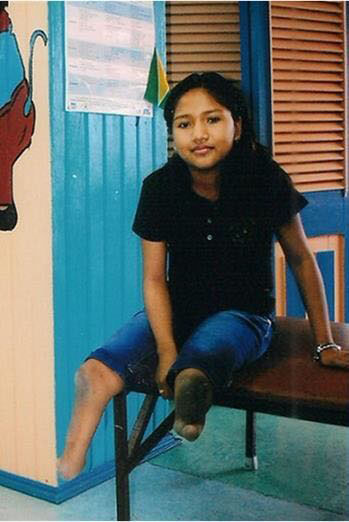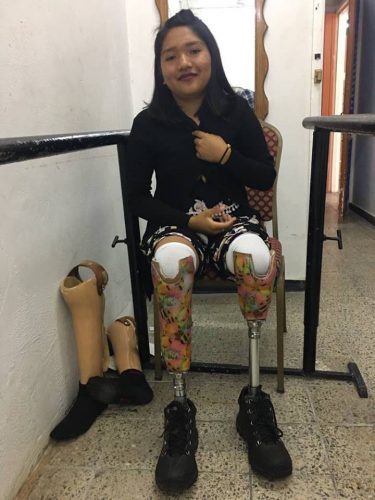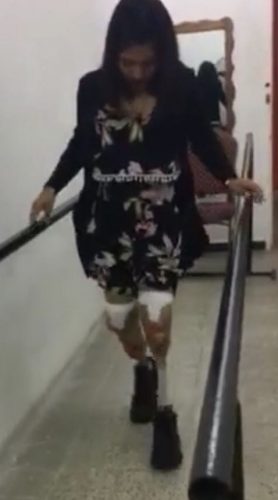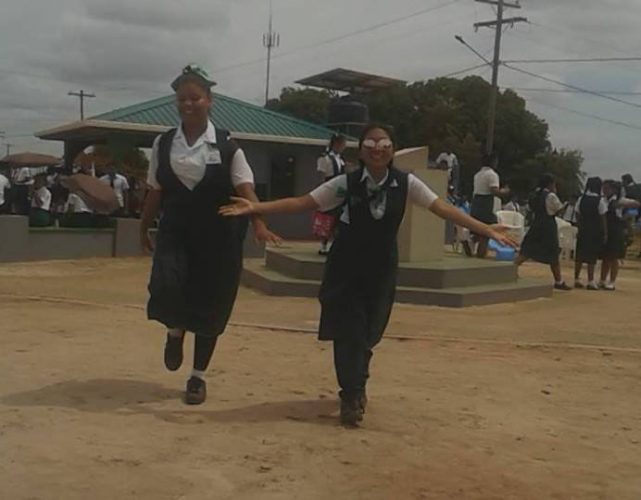Born with lower limb deficiencies, 14-year-old Tamia Lewis’ hopes of becoming an aviation pilot were restored three years ago, when she received her first pair of prosthetic legs.
Tamia, of Tabatinga, Lethem, who said her passion for travelling has pushed her into wanting to be a pilot, is not the first person in her family to be born with a disability but she refuses to think of it as such and, instead, she sees it as a blessing in disguise.
Lower limb deficiencies consist of a range of deformities, including undergrowth, overgrowth, failure of formation, failure of differentiation, duplication and constriction band syndromes.
Statistics from the Pan American Health Organization World Health Organization (PAHO/WHO) show that only 25% of children with disabilities have access to education and only 5% finish primary school.
Tamia, however, is among the 5% and is on her way to completing secondary school within the next two years. She is currently a third form student of the St Ignatius Secondary.
Like most other teenagers, she tries to do everything on her own without assistance, and she participates in sports and other extracurricular activities at school and also helps with chores around her home. She recalled that in nursery school, she would take part in the “fun day,” which included running. “I use to run but I couldn’t run that fast,” she said.
Tamia told Sunday Stabroek in a recent interview that both her grandparents were also born with different disabilities. “According to my mom, they didn’t feel no way…,” she said.
In her own case, she noted that initially her disability went unnoticed by her family in the midst of the celebrations of her birth. However, when the family later found out, nothing changed. “After they [nurses] bring me back to her, they told her about how I don’t have no feet. She was more than happy for me. According to her, she was blessed; she didn’t feel no way. She just love me from the moment she saw me,” Tamia said of her mother’s reaction.
PAHO/WHO has found that only 3% of people living with disabilities in the Americas have access to rehabilitation services, making them more vulnerable to preventable secondary diseases and other health problems.
Vulnerable groups, such as victims of violence, older adults, and people living in poverty, suffer the greatest impact from disabilities, they have said.
Tamia was fitted with her first pair of prosthetic limbs, manufactured by National Orthotic and Prosthetic Appliance Workshop of the Ptolemy Reid Rehabilitation Centre’s (PRRC) in 2016.
A prostheses or prosthetic implant is an artificial device that replaces a missing body part, which may be lost through trauma or disease, or may be a condition present at birth.
After outgrowing her first pair, Tamia was recently flown to Georgetown to be fitted with a second pair.
During her journey, she has received continuous support.
Tamia’s flight was possible through the assistance of Air Services Limited, while her accommodation and transportation during her stay were provided by the PRRC.
Tamia’s prostheses procedures were also made possible through funding from the Church of Jesus Christ of the Latter Day Saints.
“Life changer”
Tamia says her prosthetic legs are a life changer as they have enable her to do a lot more than she would have been able to otherwise.
“I can do a lot of things… I have been involved in a lot of activities. Debates, sports and so on…because these things are… like you have to move around. Back then when I didn’t have it, moving around use to be a lot more tiring,” Tamia explained.
She related that she and her parents learnt of the PRRC through a friend years prior to her first visit but they were unable to visit earlier due to financial constraints and the lack of information.
“…There was this man, Terrence, he was a pilot in Lethem and used to work with a hospital and so I knew him and he kept telling me about these people here at the rehab centre and then he linked me to them. They knew about me since I was like five but I didn’t have the opportunity to come out here because there wasn’t any proper information given to me so that I could come out here until I was like 12,” she said.
In October 2016, she said she got her first pair of prostheses. “I came here [the PRRC] just to do measurements because they weren’t sure what exactly they would be building and what the size would be and so forth. So, I came for measurements and I had to come back for the fitting,” she added.
The first pair of prostheses, she said, took a week to be prepared while the second just took three days.
Prior to acquiring her prosthetic limbs, Tamia had been prevented from attending her new secondary school since she was unable to access her classroom, which was situated on the upper flat.
However, with the aid of her prosthetic limbs, Tamia was not only able to attend school, but has since done remarkably well. She is in the top five of her class and able to participate in many more activities in her home and community.
“I was just like any normal kid but, you know, with this thing. And I used to move around on my knees, so I was normal like any other person. I used to mix with the kids at school and play with them and involve myself in activities like any normal person,” Tamia said. “I didn’t feel no way because I mean, this is who I am. I shouldn’t be ashamed of myself so I didn’t feel no way,” she added, before stating, “I am in the A class and in the top five.”
She added that in her leisure time she also exercises, goes biking with her father, and participates in volleyball on the weekends.
While she admitted that not all days are good, Tamia praised her parents for all the support they have shown her.
“Well, you [know] there are good days and bad. Most of my days [are] good with the support from my parents. Oh my god, without them I don’t know what I would have done…and the bad days, let’s say stressful, with the school work…it normally be stressful and tiring. Some days, I would just be like ‘Urgh, I just don’t wanna get up’ and you know, things like that,” Tamia said.
She also said that her peers have been very supportive of her and are always around to lend a helping hand whenever needed.
After completing school, Tamia aims to sit at least 10 subjects at the Caribbean Secondary Education Certificate (CSEC) level.
She urged other persons living with disabilities to not let them affect the pursuit of their dreams. “It’s the way God made them…You are beautiful in his image and likeness and let nothing bring you down. You can do just like I did. Let nothing stop you,” she urged.
She said positivity should be key in order to lead a successful life. “Don’t let any negative energy bring you down. Yes, you may have good and bad days but keep in mind positivity will get you there. And even though you don’t have the opportunity to get prostheses like I do, be yourself and don’t pretend to be anybody else because if you be yourself, then everybody will recognise you,” Tamia stated.












